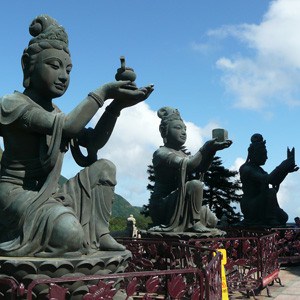Verses for various occasions

Monastic Mind Motivation
Having a “monastic mind” benefits our Dharma practice whether we are monastics or lay practitioners. A monastic mind is one that is humble, imbued with the Buddhist worldview, dedicated to cultivating mindfulness, clear knowing, love, compassion, wisdom, and other good qualities. Being mindful of the kindness I have received from all sentient beings, I will relate to them with patience, kindness, and compassion. I will be mindful of my precepts and values and will cultivate clear knowing of my thoughts and feelings, as well as how I speak and act. I will take care to act and speak at suitable times and in appropriate ways, abandoning idle talk and disruptive movements. With respect for others and confidence in my good qualities, I will be humble and easy for others to speak to. In all these activities, I will endeavor to remember impermanence and the emptiness of inherent existence and to act with bodhicitta.
Offering service (Instead of seeing your job as work, see it as offering service to the Three Jewels and to sentient beings. Recite this verse every day before going to your job.)
We are grateful for the opportunity to offer service to the Buddha, Dharma, and Sangha and to sentient beings. While working with others, differences in ideas and ways of doing things may arise. These are natural and are a source of creative exchange; our minds don’t need to make them into conflicts. We will endeavor to listen deeply and communicate wisely and kindly as we work together for our common goal. By using our body and speech to support the values we deeply believe in—generosity, kindness, ethical conduct, love, and compassion—we will create great merit which we dedicate for the awakening of all beings.
Offering food to the Sangha
With a mind that takes delight in giving, I offer these requisites to the Sangha and the community. Through my offering, may they have the food they need to sustain their Dharma practice. They are genuine Dharma friends who encourage, support and inspire me along the path. May they become realized practitioners and skilled teachers who will guide us on the path. I rejoice at creating great merit by offering to those intent on virtue and dedicate this for the awakening of all sentient beings. Through my generosity, may we all have conducive circumstances to develop heartfelt love, compassion, and altruism for each other and to realize the ultimate nature of reality.
Sangha receives the food
Your generosity is inspiring and we are humbled by your faith in the Three Jewels. We will endeavor to keep our precepts as best as we can, to live simply, to cultivate equanimity, love, compassion, and joy, and to realize the ultimate nature so that we can repay your kindness in sustaining our lives. Although we are not perfect, we will do our best to be worthy of your offering. Together, we will create peace in a chaotic world.
Preparing food
We are going to offer service by preparing a meal for the community of Dharma practitioners. How fortunate we are to have the opportunity to prepare and cook this food. The food will nourish their bodies and the love we put into preparing it will nourish their hearts.
Preparing food is an expression of our kind heart. When we chop, mix and cook, we will work with mindfulness and a relaxed mind. We will leave aside idle talk, and speak with gentle and low voices. The menu will be simple and healthy, free from the distraction of elaborate and complicated menus.
We will wash the veggies and fruits well, thinking that we are cleansing defilements from the minds of sentient beings with the nectar of wisdom. Out of consideration for those who will clean up after the meal, we will tidy up after ourselves. Let’s take joy in working harmoniously together for the benefit of all!
Prayer for Serving the Forest
By Juan Garzon Vergara, who requests that people recite it when they go to work in the forest.
Beautiful Forest,
Home and refuge to countless beings—
With a mind of respect and gratitude,
I offer this service to support your health and longevity.
May each task I engage in,
each tool I handle,
and each resource I offer
nurture your life,
and contribute to your flourishing.
With mindfulness and care,
I tend to your trees, your earth, and your stillness.
May this work bring harmony,
protect your balance,
and express my appreciation for your quiet generosity.
Knowing we are interdependent,
I respect you not as other,
but as part of this vast web of life.
May these actions plant seeds of virtue, compassion, and wisdom.
In offering this service,
may all beings benefit.
May the forest thrive,
and may this merit support the awakening of all.
Venerable Thubten Chodron
Venerable Chodron emphasizes the practical application of Buddha’s teachings in our daily lives and is especially skilled at explaining them in ways easily understood and practiced by Westerners. She is well known for her warm, humorous, and lucid teachings. She was ordained as a Buddhist nun in 1977 by Kyabje Ling Rinpoche in Dharamsala, India, and in 1986 she received bhikshuni (full) ordination in Taiwan. Read her full bio.


